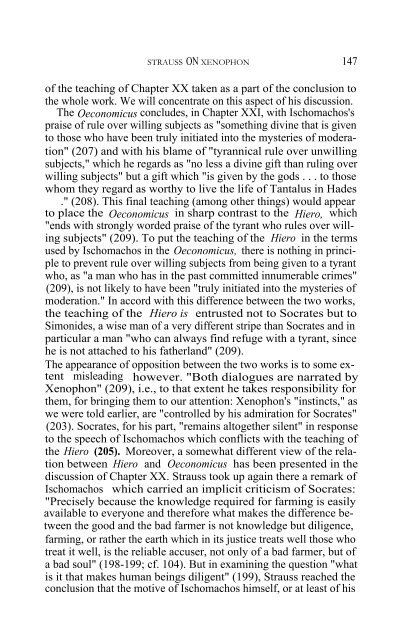Strauss on Xenophon's Socrates Xenophon's Socratic Discourse: An ...
Strauss on Xenophon's Socrates Xenophon's Socratic Discourse: An ...
Strauss on Xenophon's Socrates Xenophon's Socratic Discourse: An ...
Create successful ePaper yourself
Turn your PDF publications into a flip-book with our unique Google optimized e-Paper software.
STRAUSS ON XENOPHON 147<br />
of the teaching of Chapter XX taken as a part of the c<strong>on</strong>clusi<strong>on</strong> to<br />
the whole work. We will c<strong>on</strong>centrate <strong>on</strong> this aspect of his discussi<strong>on</strong>.<br />
The Oec<strong>on</strong>omicus c<strong>on</strong>cludes, in Chapter XXI, with Ischomachos's<br />
praise of rule over willing subjects as "something divine that is given<br />
to those who have been truly initiated into the mysteries of moderati<strong>on</strong>"<br />
(207) and with his blame of "tyrannical rule over unwilling<br />
subjects," which he regards as "no less a divine gift than ruling over<br />
willing subjects" but a gift which "is given by the gods . . . to those<br />
whom they regard as worthy to live the life of Tantalus in Hades<br />
." (208). This final teaching (am<strong>on</strong>g other things) would appear<br />
to place the Oec<strong>on</strong>omicus in sharp c<strong>on</strong>trast to the Hiero, which<br />
"ends with str<strong>on</strong>gly worded praise of the tyrant who rules over willing<br />
subjects" (209). To put the teaching of the Hiero in the terms<br />
used by Ischomachos in the Oec<strong>on</strong>omicus, there is nothing in principle<br />
to prevent rule over willing subjects from being given to a tyrant<br />
who, as "a man who has in the past committed innumerable crimes"<br />
(209), is not likely to have been "truly initiated into the mysteries of<br />
moderati<strong>on</strong>." In accord with this difference between the two works,<br />
the teaching of the Hiero is entrusted not to <strong>Socrates</strong> but to<br />
Sim<strong>on</strong>ides, a wise man of a very different stripe than <strong>Socrates</strong> and in<br />
particular a man "who can always find refuge with a tyrant, since<br />
he is not attached to his fatherland" (209).<br />
The appearance of oppositi<strong>on</strong> between the two works is to some extent<br />
misleading however. "Both dialogues are narrated by<br />
Xenoph<strong>on</strong>" (209), i.e., to that extent he takes resp<strong>on</strong>sibility for<br />
them, for bringing them to our attenti<strong>on</strong>: Xenoph<strong>on</strong>'s "instincts," as<br />
we were told earlier, are "c<strong>on</strong>trolled by his admirati<strong>on</strong> for <strong>Socrates</strong>"<br />
(203). <strong>Socrates</strong>, for his part, "remains altogether silent" in resp<strong>on</strong>se<br />
to the speech of Ischomachos which c<strong>on</strong>flicts with the teaching of<br />
the Hiero (205). Moreover, a somewhat different view of the relati<strong>on</strong><br />
between Hiero and Oec<strong>on</strong>omicus has been presented in the<br />
discussi<strong>on</strong> of Chapter XX. <str<strong>on</strong>g>Strauss</str<strong>on</strong>g> took up again there a remark of<br />
Ischomachos which carried an implicit criticism of <strong>Socrates</strong>:<br />
"Precisely because the knowledge required for farming is easily<br />
available to every<strong>on</strong>e and therefore what makes the difference between<br />
the good and the bad farmer is not knowledge but diligence,<br />
farming, or rather the earth which in its justice treats well those who<br />
treat it well, is the reliable accuser, not <strong>on</strong>ly of a bad farmer, but of<br />
a bad soul" (198-199; cf. 104). But in examining the questi<strong>on</strong> "what<br />
is it that makes human beings diligent" (199), <str<strong>on</strong>g>Strauss</str<strong>on</strong>g> reached the<br />
c<strong>on</strong>clusi<strong>on</strong> that the motive of Ischomachos himself, or at least of his

















